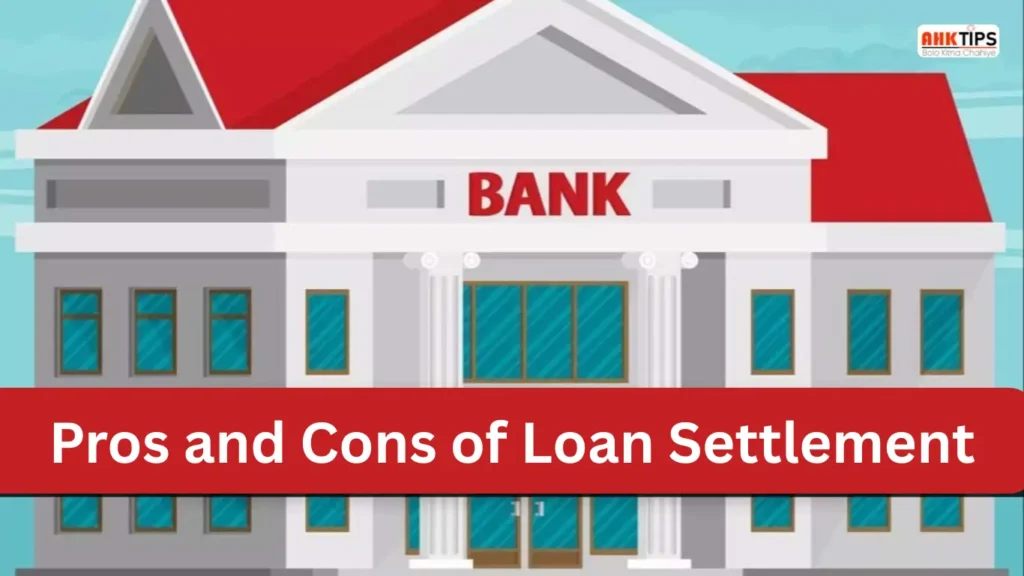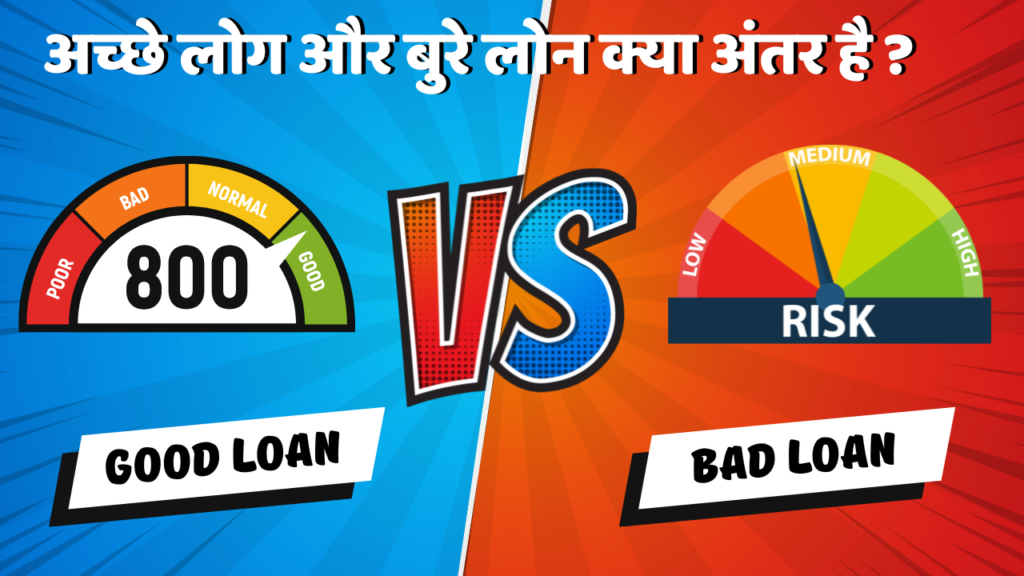Summary
Loan settlement is a process through which the bank and borrower agree to pay a reduced amount in cash. It allows immediate discharge of debt and removes court procedure, but it is very costly.
Advantages (Pros)
| Debt Relief | Pay a lesser amount to settle dues. |
| Stress Reduction | No more follow-ups or mounting pressure. |
| Avoid Legal Action | Avoids court actions and recovery agents. |
| One-Time Payment | Easier to handle than long-term EMIs. |
Disadvantages (Cons)
| Credit Score Drop | Stamped as “settled,” and not “closed.”. |
| Loan Rejection Risks: | Harder to get future loans. |
| Long-term Effect: | Affects credit report for up to 7 years. |
| Higher Interest in the Future: | They can charge more. |
Better Solutions
- EMI Restructuring
- Moratorium
- Loan Refinancing
- Debt Consolidation
Introduction
Repayment of the loan could become difficult through unforeseen events in life, such as loss of job, falling ill, or lack of funds. In that case, clearing the loan would appear to be a good solution. But is it the appropriate solution for your financial future?
Loan settlement is a procedure by which the defaulting borrower negotiates with the bank to pay a lesser amount. The bank “settles” the loan and not “closes” the loan. Though this reduces your immediate financial burden, it negatively affects your CIBIL score and your loan eligibility in the future too.
This article will enable you to know the pros and cons of loan settlement, when and how to do it, and how it will affect your credit score. We will also view the step-by-step guide to settle a loan, how to restore your credit afterwards, and safer options that can enable you not to harm your credit.
If repayments on loans feel like too much, this guide will provide you with the clarity you require. With the expert advice of AHK TIPS FINANCIAL CONSULTANTS, you can discover your best choices and pay off loans the intelligent way and protect your long-term financial wellbeing.
What is Loan Settlement? Meaning and Process Explained?
What is the process of loan settlement? Loan settlement is a deal wherein a borrower, not having sufficient funds to return the original amount of the loan, negotiates a reduced lump sum with his/her bank. If settled, the loan will be “settled” and not “closed,” which goes against the borrower’s credit rating.
When Is Loan Settlement Used?
Loan repayment typically occurs during times of financial need when it is not feasible to repay the whole loan amount. Unsecured loans like personal loans or credit card loans are typically repaid by borrowers to avoid legal action or undue debt burdens.
How Loan Settlement Works?
| Negotiation: Negotiation: Borrowers approach their bank and tell them about their financial difficulties. The lender considers the matter and offers a small lump sum for settlement. |
| Written settlement: Once the terms are agreed to, the bank issues a written offer of settlement. |
| Payment: The borrower pays the agreed amount within the deadline. |
| No Dues Certificate: After payment, the borrower obtains a certificate confirming the loan’s settlement. |
Settlement provides temporary relief but hurts your CIBIL score, reducing future loan eligibility. It can be considered only as a last resort after attempting alternatives like restructuring of the loan or reducing EMI.
Top Advantages (Pros) of Loan Settlement for Financial Relief?
Benefits of loan settlement are most apparent when borrowers face financial hardship. While it has drawbacks, settlement can offer several advantages:
Debt Relief
Loan settlement allows borrowers to pay a reduced lump sum, alleviating their financial burden significantly. This can help them regain stability and focus on rebuilding their finances.
Stress Reduction
Dealing with mounting debt can lead to emotional strain. By settling the loan, borrowers experience immediate relief, easing stress related to unpaid dues and constant lender follow-ups.
Avoiding Legal Action
Settlement prevents lenders from initiating legal proceedings due to non-payment, helping borrowers avoid court battles or debt recovery lawsuits.
Simplified Resolution
Instead of continuing with unmanageable EMIs, borrowers close their accounts through a one-time payment, simplifying their financial situation.
While loan settlement offers these benefits, it negatively impacts credit scores and is marked as “settled,” not “closed.” This status remains in credit reports for up to 7 years, affecting future loan approvals.
Settlement should only be considered in emergencies and as a last resort after exploring alternatives like restructuring or EMI reduction
Major Disadvantages (Cons) of Loan Settlement on Credit Score?
Disadvantages of loan settlement can significantly affect your financial profile. While it may provide immediate relief, here are the key drawbacks:
Impact on CIBIL Score
Loan settlement is marked as “settled,” indicating partial repayment. This status reduces your CIBIL score considerably, making you less creditworthy to lenders in the future.
Loan Rejection Risks
Low credit rating and “settled” status on your credit report affect future lending more. Even when they do lend to you, lenders add extra interest or less favorable terms because they feel there are risks to them.
Long-Term Effects
The “settled” status stays in your credit report for up to 7 years, continuously impacting your ability to obtain credit. This can delay financial growth or important life goals requiring loans, such as home buying or business expansion.
Limited Alternatives
A bad credit record limits options like balance transfer or refinancing, which can improve your financial well-being.
Loan settlement must be opted for only during emergencies after keeping other alternatives like loan restructuring or EMI cut in mind. Once a settlement is done, care must be taken to revive the credit score by adopting prudent financial practices.
How Loan Settlement Affects Your CIBIL Score?
A loan settlement CIBIL rating can have a big impact on your credit history. Though it provides short-term financial relief, its long-term implications are something you should know about.
| Marked as “Settled” | When a loan is settled, it is updated as “settled” instead of “closed” in your credit report. This indicates that the borrower repaid only a portion of the loan, signaling financial distress to lenders. |
Drop in Credit Score | Loan settlement leads to a noticeable decrease in your CIBIL score. A low score reflects risk, making it harder for lenders to trust your ability to repay future loans. |
| Extended Impact | The “settled” status remains in your credit report for up to 7 years, affecting your creditworthiness during this period. |
| Challenges in Securing Loans | A low credit score combined with a “settled” tag creates difficulties in obtaining new loans. Lenders may reject applications or charge higher interest rates due to perceived risks. |
| Reduced Financial Flexibility | A damaged credit profile limits opportunities like refinancing or balance transfers, which can help manage debt effectively. |
Loan Settlement vs. Loan Closure: Know the Difference?
When managing debt, understanding loan settlement vs. loan closure is crucial for making informed financial decisions. Here’s how they differ:
Loan Settlement
| Definition | Borrowers negotiate with the lender to pay a reduced lump-sum amount when they cannot repay the full loan. |
| Credit Report Status | Marked as “settled,” indicating partial repayment due to financial difficulty. |
| Impact on Credit Score | Negatively affects credit scores, as it reflects financial distress. |
| Long-Term Effect | “Settled” status remains in credit reports for up to 7 years, affecting future loan eligibility. |
Loan Closure
| Definition | Borrowers repay the entire loan amount, including principal and interest, as per the original agreement. |
| Credit Report Status | Marked as “closed,” signifying complete repayment. |
| Impact on Credit Score | Positively influences credit scores, showing financial reliability. |
| Long-Term Effect | Strengthens creditworthiness and improves eligibility for future loans. |
Key Takeaway
| Loan settlement is a last resort for financial emergencies, but it harms creditworthiness. |
| Loan closure reflects responsible repayment and helps build a stronger credit profile. |
When Should You Consider Loan Settlement?
When to settle a loan is an important decision that depends on specific financial circumstances. Here are key situations when loan settlement might be the right choice:
Severe Financial Hardship
If you are having trouble covering daily expenses or are facing a loss of income, and paying back the entire loan amount is not possible, settlement can offer relief.
Unmanageable Debt Burden
Where your debt has run out of control, and you cannot service EMIs despite trying alternatives like restructuring or reduction of EMI, settlement may become the only option.
Unsecured Loans Only
Settlement is more appropriately left for unsecured lending, such as credit cards and personal loans, where there is less that lenders can recover.
Avoiding Legal Action
If the lender is going to take you to court because of failure to pay, repaying the loan will help to avoid further hassles.
Non-Performing Loans
When your loan becomes a Non-Performing Asset (NPA), banks will make a settlement to retrieve some amount of money due.
Important Considerations
Settling the loan damages your CIBIL score and should be your last alternative. Seek alternative avenues like restructuring or moratorium before you settle.
How to Do a Loan Settlement: Step-by-Step Guide?
| Contact the Bank | Reach out to your bank and explain your financial difficulties. Be honest and ask about loan settlement options. |
Share Proof of Hardship | The bank may ask for documents like salary slips, medical bills, or job termination letters. These help show your genuine financial condition. |
| Negotiate the Settlement Amount | Discuss and agree on a reduced one-time payment to settle the loan. Make sure you get the offer in writing. |
| Make the Payment | Pay the agreed amount within the deadline. Always use official channels and keep your receipt safe. |
| Get a No Dues Certificate | Once paid, collect a “No Dues Certificate” from the bank. This confirms your loan is closed from the bank’s side. |
| Check Your Credit Report | Ensure your credit report shows the loan status as “settled.” It may affect your credit score, so keep monitoring it. |
Knowing how to do a loan settlement the right way can help you regain control of your finances. With expert help from AHK TIPS, you don’t have to face it alone.
Can You Get a Loan After a Loan Settlement?
Loan after settlement is possible, but challenging due to its negative impact on your credit score. Here’s what to expect and how to rebuild credit for future loan approval.
Realistic Expectations
| Lower Loan Approval Chances | After settlement, lenders see you as a high-risk borrower, making loan approvals difficult |
| Higher Interest Rates | If approved, expect higher interest rates due to reduced creditworthiness. |
| Strict Loan Terms | Lenders may impose tougher conditions, such as shorter repayment periods or secured loan requirements. |
Steps to Rebuild Your Credit
| Check Your Credit Report | Ensure your loan is correctly marked as “settled” and monitor your score. |
| Repay Existing Dues | Paying off other outstanding debts improves your credit profile. |
| Use Credit Responsibly | Timely payments on small loans or credit cards rebuild lender trust. |
| Opt for Secured Credit | Consider a secured credit card or loan to gradually improve your score. |
| Wait and Strengthen Credit | Give yourself time to increase your CIBIL score before reapplying for loans. |
Alternatives to Loan Settlement That Won’t Hurt Your Credit Score?
Alternatives to loan settlement provide ways to manage financial difficulties without damaging your credit score. Here are effective options:
EMI Restructuring
- You can negotiate with your lender to extend the loan tenure, reducing monthly EMI payments.
- A lower EMI makes repayment easier while keeping your credit score intact.
Loan Moratorium
- A moratorium allows you to pause EMIs for a specific period.
- This option is useful during financial hardships, ensuring temporary relief without marking the loan as “settled.”
Loan Refinancing
- Transfer your loan to another bank offering lower interest rates or better repayment terms.
- This helps reduce the burden while maintaining a positive credit history.
Debt Consolidation
- If you have multiple loans, consolidating them into a single loan with lower EMIs and better terms can simplify repayment.
Why Choose These Alternatives?
Unlike loan settlement, which lowers your CIBIL score and stays in your report for up to 7 years, these methods protect your credit profile while providing financial relief.
Tips to Recover Your Credit Score After Loan Settlement?
Rebuild credit after settlement with smart financial strategies. Loan settlement lowers your CIBIL score, but these steps can help restore your credit health:
Check Your Credit Report
- Review your credit report to ensure your loan is correctly marked as “settled.”
- Identify and correct any inaccuracies that may further harm your score.
Pay Off Existing Dues
- Clear outstanding payments on other loans and credit cards to improve your repayment record.
- Timely payments help rebuild trust with lenders.
Use a Secured Credit Card
- Apply for a secured credit card backed by a fixed deposit.
- Regular small purchases and timely repayments boost your credit score gradually.
Take Small Loans & Repay on Time
- Consider short-term loans with manageable EMIs and ensure on-time payments.
- Consistent repayment strengthens your creditworthiness.
Maintain Low Credit Utilization
- Keep your credit usage below 30% of your limit to show responsible borrowing habits.
Avoid New Loan Settlements
- Settling another loan further damages your credit score.
- Focus on repayment strategies that maintain a positive credit history.
Conclusion
Loan settlement can provide immediate relief if you’re going through a tough financial phase like job loss, medical emergencies, or rising debt. It helps reduce your repayment amount and avoid legal troubles. However, it’s not without serious consequences.Once a loan is settled, it is marked as “settled” (not “closed”) in your credit report.
This reduces your CIBIL score and is kept on your credit record for up to 7 years, making it harder to get loans in the future or forcing you to pay higher interest rates and tougher terms.
That is why loan settlement is a last resort at best, never a default option. Always look for safer alternatives like EMI restructuring, loan moratorium, refinancing, or debt consolidation before you attempt loan settlement so that you can service your burden without hurting your credit score.
If you do go forward with settlement, do it the proper way, get it in writing, and work towards rebuilding your credit with on-time payments, secured credit cards, and good money management.
With expert advice from AHK TIPS FINANCIAL CONSULTANTS, you will be making informed choices, avoiding mistakes, and attaining financial security.
Frequently Asked Questions (FAQ’s)
Ans: Disadvantages of settling a loan are a major fall in your CIBIL score, which will become difficult to get a loan in the future. It’s marked as “settled,” not “closed,” and remains on your credit report for up to 7 years.
Ans: Benefits of settlement of loan are instant financial comfort by decreasing your debt burden. It avoids legal proceedings by lenders and ends worrying, enabling the borrowers to concentrate on rebuilding finances. It adversely affects credit ratings.
Ans: Loan settlement lowers CIBIL score significantly. The loan is marked as “settled” and not “closed,” indicating part repayment. The negative mark is on your report for as much as 7 years, affecting future loan sanction Que: What are the disadvantages of debt settlement? Ans: Disadvantages of debt settlement are a tremendous drop in your credit score, which will make it harder to get future loans. It’s reported as “settled,” not “closed,” and remains on your credit report for up to 7 years.
Ans: Benefits of settlement of loan include settling your debt burden in one go after negotiation. It prevents legal action by lenders, gives immediate relief in terms of money, and relieves stress, enabling the borrower to focus on getting back on the financial track.













